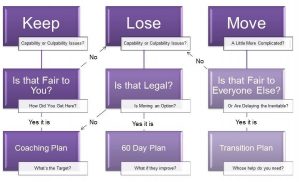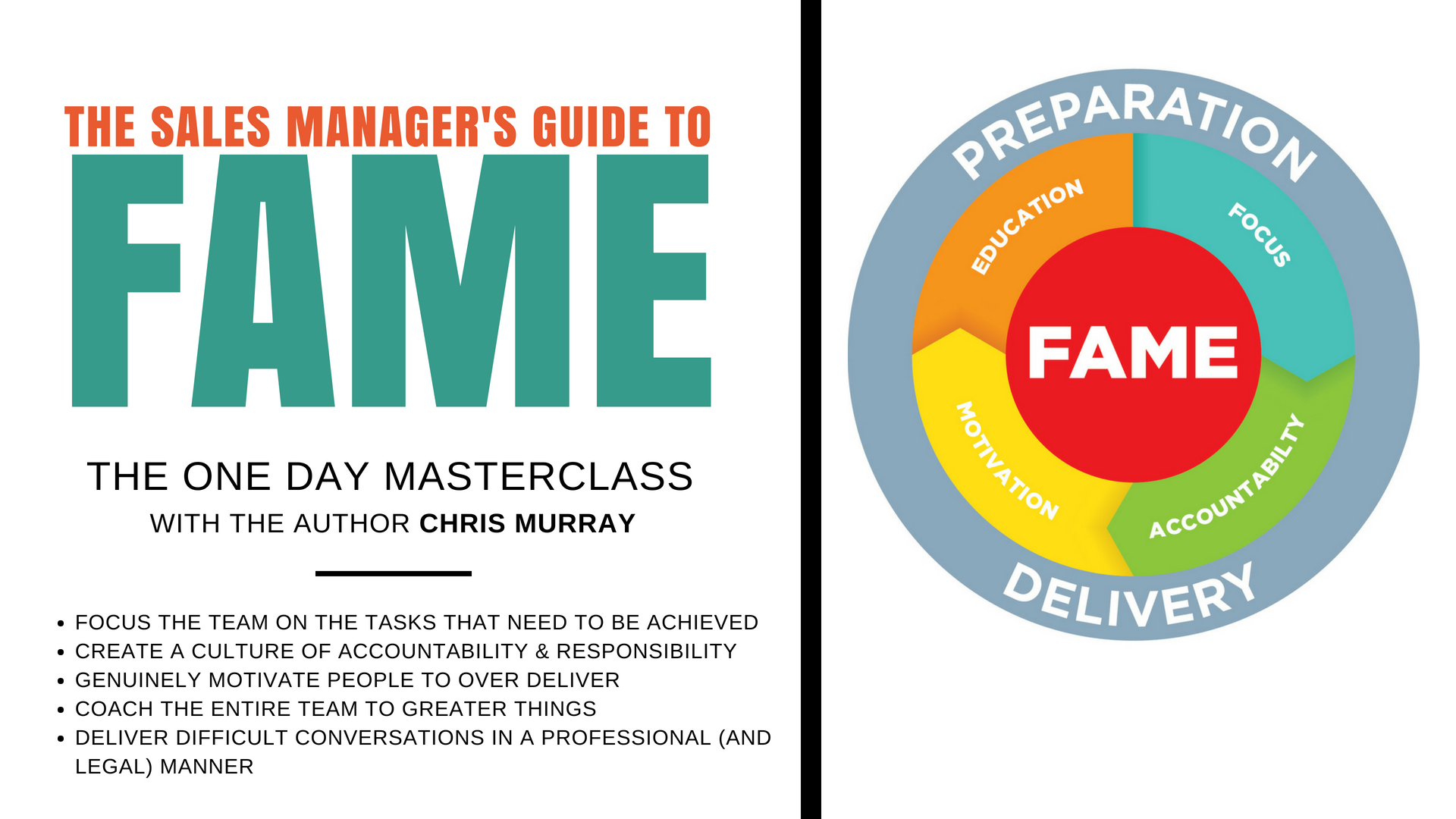How Soon Should You Fire an Ineffective Salesperson?
Hanging on to an ineffective or disruptive salesperson rarely makes good business sense – and to be fair, probably isn’t best in the long term for the employee either.
 But there are times when disciplinary procedures can become an emotional – and legal – minefield.
But there are times when disciplinary procedures can become an emotional – and legal – minefield.
A couple of weeks ago I introduced regular readers to a simple template (follow this link) which they could use to help them work effectively through any discipline situation, which I shortened to – A.B.A.C.U.S.
But what happens if – while working your way through a disciplinary procedure – you realise that it isn’t going to be as straight forward as you initially thought?
On some occasions you might be confronted by more than the two fairly obvious options of KEEPING THEM or LETTING THEM GO.
What do you do, if you think this individual is just being badly utilised by your department?
Or what if they’ve done nothing terribly wrong, but you just don’t get on with each other – it just turns out to be a clash of personalities?
Well, that’s when you might start thinking;
“hey, maybe there’s another department that I can move them to, with a lot less fuss and heartache than sacking them.”
Which gives us a third dimension; Keep – Lose – or Move
To help explain, here are all 3 options in a little more detail (I’ve even created a diagram to help you visualise each one)
 Keep
Keep
Before you make any decision about keeping or losing, you’ve first got to work out whether or not you’re handling a Capability or a Culpability issue
If you decide that it just might be easier for everyone involved to stay as they are, work a bit harder and try and work everything out – you should really ask yourself whether that choice is going to be fair on you or fair the other members of your team.
I know FAIR is an odd thing to introduce with regards to the person who isn’t being threatened with the push – but you and the whole team are part of this equation – some might even say the team and business might represent the greater good.
You see, giving a charitable last chance to the member of your team who can’t get out of bed to see customers might seem like a nice thing to do – but it might very well damage the success (and health) of a great deal many more than Mr Sleepyhead (who could possibly learn a much bigger life lesson by being shown the door).
However – if it turns out that you are definitely keeping them on – then you need to develop a coaching plan.
Don’t just leave the room saying something like; “So – I’m expecting to see some big changes” slap him on the shoulder and hope for the best.
Take a look at this article on sales team coaching and make sure you’re not failing talented people – people who could help you to become an extremely successful sales manager or sales director – if you’d just focus a little more time on helping them do their job.
Remember – when you become a manager, your job changes from hitting sales targets to making sure sales targets get hit!
Move
Likewise, before you decide just to hoof them off to another department (because a long, drawn out disciplinary procedure scares you, or worse – because they’ve actually done nothing wrong) ask yourself if it’s fair on the colleague who will end up managing them next.
Also – is moving them just delaying the inevitable?
If it is the right thing to do – then you’re going to need some form of transition plan.
And that plan can’t just be a cold piece of paper with a list of dates and times.
Write at the top of the page the reason for the move. Put down the WHY and then the HOW.
Once you have that in big, bold letters you’ll have a steering on what needs to be achieved – that’s when you can start working on the WHEN, WHERE & WHO.
If you can’t think of a convincing and sincere WHY – then you’re just creating bigger problems – but this time with your colleagues and peers – some time later down the line.
Lose
If you’re thinking of diving straight into sacking them with a bit of an angry temper and the annoyance that life hasn’t quite panned out the way you wanted it to – just ask yourself this question first;
Is this situation THEIR FAULT or YOURS?
And then ask yourself;
Is what I’m planning to do legal or will it come back and bite me on the behind?
If it’s a capability issue then you should reconsider a coaching plan or possible move to another department.
But if you are sure – beyond doubt – that this is a culpability issue, then you need to have a 60 day plan ready.
In fact, you should build a 60 day plan way before you ever need one – even if you can’t see a time when you’ll ever use it.
In fact – do it now.
To make your 60 day plan effective you have to have done some work on your sales team’s ACOUNTABILITY.
ACCOUNTABILITY makes us ask – WHO – as in “Whose job is it?”
Once you’ve worked out what you and what the rest of the team are individually responsible for achieving, you need to work out reasonable numbers – and with those you can create some level of EXPECTATION.
Because that’s what your 60 day plan needs to have running through it – the expectations of you, the business and the rest of the team – what all those parties expect from the individual involved.
Once you have a 60 day plan, with reasonable expectations – you need COMMITMENT.
The member of your team who is being given this olive branch for redemption must commit to matching or exceeding your reasonable expectations.
And this is where you make it clear that you will offer all the help and support they require – including a half way (30 day) review to make sure they are on the right path and that they feel they are receiving everything they need to succeed.
It should also be made clear that if this person does not meet the reasonable expectations during the 60 day time frame, then – in the best interests of all concerned – they will have to find their employment happiness elsewhere.
But what if they DO improve during those 60 Days?
What if they suddenly turn into a perfect, model citizen? What do you do then?
Well, that takes you right back to the “Coaching Plan” stage of ABACUS – and you execute that coaching plan with passion, energy and tenacity – so that you make sure it never gets to this point ever again – although, in reality….
****************************************************
UK Workshops
LONDON | MANCHESTER
(click on preferred city for full details)

Our Sales Management Open Workshops show you how to piece together the four main elements of successfully managing a team – Focus; Accountability; Motivation; Education – and show you how to get the best out of everyone involved.



